高考英语常用词汇辨析500组人教版新课标
- 格式:doc
- 大小:114.00 KB
- 文档页数:21

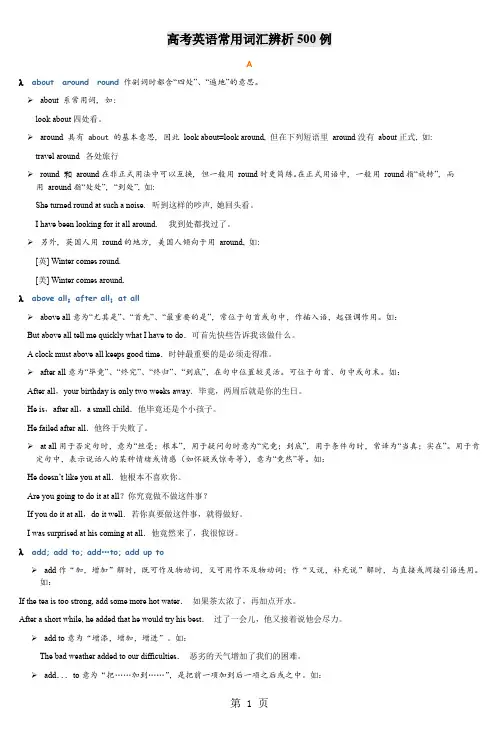
高考英语常用词汇辨析500例Aλabout around round作副词时都含“四处”、“遍地”的意思。
about 系常用词, 如:look about四处看。
around 具有 about 的基本意思, 因此look about=look around, 但在下列短语里around没有about正式, 如:travel around 各处旅行round 和around在非正式用法中可以互换, 但一般用round时更简练。
在正式用语中, 一般用round指“旋转”, 而用around指“处处”, “到处”, 如:She turned round at such a noise. 听到这样的吵声, 她回头看。
I have been looking for it all around. 我到处都找过了。
另外, 英国人用round的地方, 美国人倾向于用around, 如:[英] Winter comes round.[美] Winter comes around.λabove all;after all;at allabove all意为“尤其是”、“首先”、“最重要的是”,常位于句首或句中,作插入语,起强调作用。
如:But above all tell me quickly what I have to do.可首先快些告诉我该做什么。
A clock must above all keeps good time.时钟最重要的是必须走得准。
after all意为“毕竟”、“终究”、“终归”、“到底”,在句中位置较灵活。
可位于句首、句中或句末。
如:After all,your birthday is only two weeks away.毕竟,两周后就是你的生日。
He is,after all,a small child.他毕竟还是个小孩子。
He failed after all.他终于失败了。
at all用于否定句时,意为“丝毫;根本”,用于疑问句时意为“究竟;到底”,用于条件句时,常译为“当真;实在”。
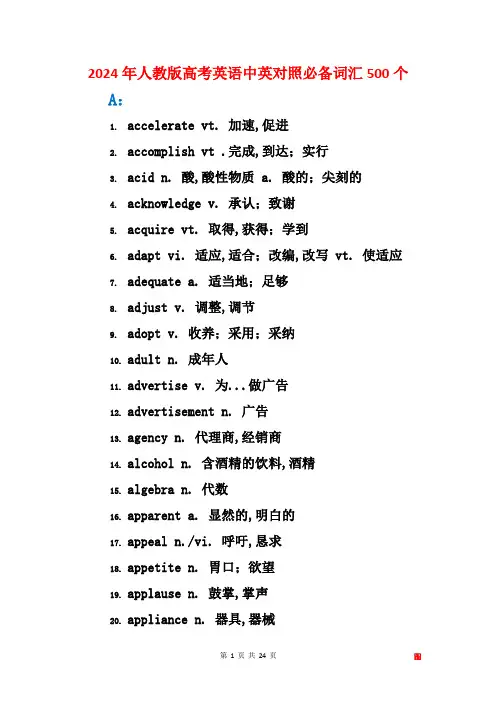
2024年人教版高考英语中英对照必备词汇500个A:1.accelerate vt. 加速,促进2.accomplish vt .完成,到达;实行3.acid n. 酸,酸性物质 a. 酸的;尖刻的4.acknowledge v. 承认;致谢5.acquire vt. 取得,获得;学到6.adapt vi. 适应,适合;改编,改写 vt. 使适应7.adequate a. 适当地;足够8.adjust v. 调整,调节9.adopt v. 收养;采用;采纳10.adult n. 成年人11.advertise v. 为...做广告12.advertisement n. 广告13.agency n. 代理商,经销商14.alcohol n. 含酒精的饮料,酒精15.algebra n. 代数16.apparent a. 显然的,明白的17.appeal n./vi. 呼吁,恳求18.appetite n. 胃口;欲望19.applause n. 鼓掌,掌声20.appliance n. 器具,器械21.applicant n. 申请人22.appoint vt. 任命,委派23.appreciate vt. 重视,赏识,欣赏24.approach v. 靠近,接近 n. 途径,方式25.appropriate a. 适当的26.approve v. 赞成,同意,批准27.arbitrary a. 随意的,未断的28.architect n. 建筑师29.architecture n. 建筑学30.arise vi. 产生,出现,发生;起身31.arithmetic n. 算术32.arouse vt. 引起,激起;唤醒33.aspect n. 方面;朝向;面貌34.attach vt. 系,贴;使附属35.attitude n. 态度36.automatic a. 自动的37.available a. 现成可用的;可得到的38.avenue n. 林荫道,大街39.award vt. 授予,判给 n. 奖品,奖金40.aware a. 意识到41.awful a. 极坏的,威严的,可怕的42.awkward a. 笨拙的,棘手的B:43.bachelor n. 学士,学士学位;单身汉44.bacteria n. 细菌45.balcony n. 阳台46.ban vt. 取缔,禁止47.bargain n. 便宜货 vi. 讨价还价48.barrier n. 障碍;棚栏49.battery n. 电池(组)50.beforehand ad. 预先,事先51.biology n. 生物学52.bother v. 打搅,麻烦53.boundary n. 分界线,边界54.breed n. 种,品种 v. 繁殖,产仔55.budget n. 预算 v. 编预算,作安排56.bunch n. 群,伙;束,串57.burden n. 重担,负荷58.burst vi./n. 突然发生,爆裂C:59.calculate vt. 计算,核算60.calendar n. 日历,月历61.campus n. 校园62.cancel vt. 取消,废除63.candidate n. 候选人64.capture vt. 俘虏,捕获65.career n. 生涯,职业66.catalog n. 目录(册) v. 编目67.ceremony n. 典礼,仪式68.chaos n. 混乱,紊乱69.cliff n. 悬崖,峭壁70.clue n. 线索,提示71.coach n. 教练;长途公共汽车72.code n. 准则,法规,密码73.collision n. 碰撞,冲突74.column n. 柱,圆柱;栏,专栏edy n. 喜剧ment n./vt. 评论munity n. 社区,社会parable a. (with,to)可比较的,类似的parative a. 比较的,相对的pete vi. 竞争,比赛petent a. 有能力的,能胜任的petition n. 竞争,比赛83.conquer vt. 征服84.conservation n. 保存,保护85.conservative a. 保守的86.constant a. 不变的,恒定的 n. 常数87.consume v. 消耗,耗尽88.continual a. 不断地,频繁的89.continuous a. 继续的,连续(不断)的90.cope vi. (with)(成功地)应付,处理91.core n. 果心,核心D:92.dash vi. 猛冲,飞奔93.data n. 数据,资料94.deaf a. 聋的;不愿听的95.debate n./v. 辩论,争论96.debt n. 欠债97.decade n. 十年98.decline v. 拒绝,谢绝;下降99.decorate vt. 装饰,装潢100.delay vt./n. 推迟,延误,耽搁101.delicate a. 易碎的;娇弱的;精美的102.deposit n. 存款,定金 v.存放,储蓄103.derive vt. 取得,得到;(from)起源于104.deserve vt. 应受,应得,值得105.device n. 装置,设备106.discipline n. 纪律;惩罚;学科107.discount n. (价格)折扣108.discrimination n. 歧视;辨别力109.display n./vt. 陈列,展览110.dispose vi. 除掉;处置;解决;处理(of) 111.distinguish vt. 区分,辨别112.distribute vt. 分发113.disturb vt. 打搅,妨碍114.dive vi. 跳水,潜水115.diverse a. 不同的,多种多样的116.durable a. 耐用的,持久的117.duration n. 持续,持续期间118.dusk n. 黄昏,薄暮E:119.earnest a. 认真的,诚挚的120.earthquake n. 地震121.elbow n. 肘122.emotion n. 情感,感情123.emotional a. 感情的,情绪(上)的124.emphasize vt. 强调,着重125.enclose vt. 围住;把...装入信封126.encounter vt./n. 遭遇,遭到127.ensure vt. 给...保险,保证,确保128.entertainment n. 娱乐;招待,款待129.enthusiasm n. 热情,热心130.entitle vt. 给...权利,给...资格131.entry n. 进入,入口处;参赛的人(或物)132.environment n. 环境133.equivalent a. 相等的 a. 相等物134.essential a. 必不可少的;本质的135.estimate n./vt. 估计,估量136.evaluate vt. 评估,评价137.evil a. 邪恶的,坏的138.evolution n. 演变,进化139.evolve v.演变140.exaggerate v. 夸大,夸张141.exclude vt. 把...排斥在外,不包括142.exclusive a. 独有的,排他的143.expand v. 扩大,扩张;展开,膨胀144.expansion n. 扩大,扩充;发展,膨胀145.expense n. 开销,费用146.expensive a. 花钱多的;价格高贵的147.explode v. 爆炸;爆发;激增148.exploit v. 剥削;利用,开采149.explore v. 勘探150.explosion n. 爆炸;爆发;激增151.explosive a. 爆炸的;极易引起争论的152.export n. 出口(物) v. 出口,输出153.extent n. 程度,范围,大小,限度154.external a. 外部的,外表的,外面的155.extinct a. 绝灭的,熄灭的156.extreme a. 极度的,极端的 n. 极端,过分F:157.facility n. [pl.] 设备,设施;便利,方便158.fate n. 命运159.fatigue n. 疲劳,劳累160.faulty a. 有错误的,有缺点的161.favorite a. 特别受喜欢的 n. 喜爱的人或物162.fax n./vt. 传真163.female a. 女性的,雌的164.fertile a. 肥沃的;多产的165.fertilizer n. 肥料166.flash vi. 闪光,闪耀167.flee vi. 逃走168.flexible a. 易弯曲的169.focus v. (使)聚集 n. 焦点,中心,聚焦170.forbid vt. 不许,禁止171.frown v./n. 皱眉172.frustrate vt. 使沮丧G:173.gallon n. 加仑174.gap n. 间隔,差距175.garbage n. 垃圾,废物176.gasoline n. 汽油177.gaze v. 凝视,注视178.gene n. 基因179.generate vt. 生成,产生(光、热、电等)180.genius n. 天才,天赋181.genuine a. 真的,真诚的182.geography n. 地理(学)183.geology n. 地质学184.geometry n. 几何(学)185.germ n. 微生物,细菌186.gesture n. 姿势,手势187.global a. 全球的;总的188.globe n. 地球,世界;地球仪189.glorious n. 光荣的,极好的190.glory n. 光荣,荣誉191.golf n. 高尔夫球运动192.grand a. 宏伟大,壮丽的,重大的193.grant vt. 授予,同意,准予194.grateful a. 感激的195.gratitude n. 感激196.guarantee vt./n. 保证197.guilty a. 内疚的;有罪的H:198.harmony n. 和谐,融洽199.hatred n. 憎恶,憎恨200.herd n. 兽群,牧群201.hesitate v. 犹豫202.highlight vt. 强调,突出203.hint n. 暗示,示意204.hollow a. 空的,中空的,空虚道205.holy a. 神圣地,圣洁的206.hook n. 钩207.hook n. 钩 vt. 钩住208.horrible a. 可怕的209.horror n. 恐怖210.household n. 家庭,户211.hydrogen n. 氢212.identify n. 身份;个性,特性213.identify vt. 认出,鉴定214.idle a. 懒散的,无所事事的215.illegal a. 不合法的,非法的216.import n. 进口(物) v. 进口,输入217.incident n. 事件,事变218.individual a. 个别的,单独的 n. 个人,个体219.inevitable a. 不可避免的220.infant n. 婴儿221.infect v. 传染222.infer v. 推论,推断223.inferior a. 劣等的,次的,下级的224.inhabitant n. 居民225.insurance n. 保险,保险费226.internal a. 内部的,国内的227.Internet n. 国际互联网,因特网228.interpret v. 翻译,解释229.interpretation n. 解释,说明230.invade v. 侵入,侵略,侵袭231.isolate vt. 使隔离,使孤立232.issue n. 问题,争论点;发行,(报刊)一期233.jealous a. 妒忌的234.jeans n. 牛仔裤235.jewel n. 宝石236.joint a.连接的;共同的237.jungle n. 丛林,密林238.junior a. 年少的;资历较浅的K:239.kneel vi. 跪240.knot n. 结 vt. 把...打成结L:bel n. 标签unch vt. 发动,发起243.leak v. 漏,渗出244.lean vi. 倾斜,倚,靠245.leap vi. 跳跃246.leather n. 皮革247.leisure n. 闲暇;悠闲248.lest conj. 唯恐,免得249.liberty n. 自由250.license /license n. 许可证251.likelihood n. 可能,可能性252.liter/litre n. 升253.loose a. 松的,宽松的254.lunar a. 月的,月球的M:255.mainland n. 大陆256.maintain vt. 维持,保持;坚持,主张257.male a. 男性的,雄的258.manufacture vt./n. 制造,加工259.marine a. 海的;海产的260.massive a. 大的,大量的,大块的261.mature a. 成熟的262.maximum a. 最高的,最大的263.media n. 新闻传媒264.medium a. 中等的,适中的 n. 媒介物,新闻媒介265.merchant n. 商人266.mere a. 仅仅的,只不过的;纯粹的267.minimum a. 最低的,最小的268.missile n. 导弹269.mission n. 使命;代表团270.mist n.薄雾271.mixture n. 混合,混合物272.modest a. 谦虚273.mood n. 心情,情绪;语气274.moral a. 道德上的,有道德的275.motivate vt. 激励,激发276.motive n. 动机,目的N:277.naval a. 海军的278.navigation n. 航行279.necessity n. 必需品;必要性280.negative a. 否定的,消极的281.neglect vt. 忽视,忽略282.neutral a. 中立的,中性的283.nevertheless ad. 仍然,然而,不过284.nonsense n. 胡说,冒失的行动285.noticeable a. 显而易见到286.nuclear a. 核子的,核能的287.nucleus n. 核288.numerous a. 众多的,许多的289.nylon n. 尼龙O:290.odd a. 奇特的,古怪的;奇数的291.offend v. 冒犯,触犯292.onion n. 洋葱293.opponent n. 敌手,对手294.opportunity n. 机会,时机295.optimistic a. 乐观296.optional a. 可以任选的,非强制的297.oral a. 口头的,口述的,口的298.orbit n. 轨道 v. (绕...)作轨道运行299.orchestra n. 管弦乐队an n. 器官,风琴301.origin n. 起源,出身302.outstanding a. 杰出的,突出的,显著的303.oxygen n. 氧P:304.parade n. 游行 v. 列队行进305.parallel n. 平行线;可相比拟的事物306.partial a. 部分的307.participate v. (in)参与,参加308.particularly ad. 特别,尤其309.passion n. 激情,热情310.passive a. 被动的,消极的311.passport n. 护照312.pat v./n. 轻拍,轻打313.peak n. 山峰,顶点314.personal a. 个人的,私人的;亲自的315.petrol n. 汽油316.phenomenon n. 现象317.portion n. 一部分318.poverty n. 贫穷319.powder n. 粉末320.preserve v. 保护,保存,保持,维持321.previous a. 先,前,以前的322.primitive a. 原始的,早期的323.principal a. 最重要的 n. 负责人,校长324.principle n. 原则,原理325.priority n. 优先,重点326.private a. 私人的,个人的327.professional a. 职业的,专门的328.profit n. 利润,益处;v. 有益于,有利于329.profitable a. 有利可图的330.prohibit vt. 禁止,不准331.promote vt. 促进;提升332.prospect n. 前景,前途;景象333.pursue vt. 追逐;追求;从事,进行Q:334.quit v. 停止335.quotation n. 引文,引语R:336.racial a. 人种的种族的337.radiation n. 放射物,辐射338.recreation n. 娱乐活动339.region n. 地区;范围;幅度340.register v./n.登记,注册341.regulate vt. 管理,调节342.reject vt. 拒绝343.release vt./n. 释放,排放;解释解脱344.relevant a. 有关的,切题的345.reliable a. 可靠的346.relief n. 轻松,宽慰;减轻347.religion n. 宗教,宗教信仰348.religious a. 宗教的349.reluctant a. 不情愿的,勉强的350.rely vi. (on ,upon)依赖,指望351.remarkable a. 值得注意的,异常的,非凡的352.remote a. 遥远的,偏僻的353.removal n. 除去,消除354.repetition n. 重复,反复355.reputation n. 名气,声誉356.rescue vt./n. 营救357.resemble vt. 像,类似于358.respond vi. 回答,答复;反应359.response n. 回答,答复;反应360.restrict vt. 限制,约束361.resume v. 重新开始362.reveal vt. 揭露363.ridge n. 脊,山脊,埂364.ridiculous a. 可笑的,荒漠的365.rigid a. 严格的;僵硬的366.route n. 路;路线;航线367.ruin v. 毁坏,破坏 n. 毁灭,[pl.]废墟S:368.sake n. 缘故,理由369.satellite n. 卫星370.scale n. 大小,规模;等级;刻度371.scan vt. 细看;扫描;浏览372.scratch v./n. 抓,搔,扒373.secure a. 安全的,可靠的374.security n. 安全,保障375.semester n. 学期;半年376.semiconductor n. 半导体377.seminar n. 研讨会378.sensible a. 明智的379.severe a. 严重的380.sexual a. 性的381.shallow a. 浅的382.shelter n. 掩蔽处;住所383.shift v. 转移;转动;转变384.shrink vi. 起皱,收缩;退缩385.shrug v./n. 耸肩386.shuttle n. 梭子;航天飞机387.signature n. 签名388.significance n. 意义;重要性389.simplicity n. 简单;朴素390.simplify vt. 简化391.sincere a. 诚挚的,真诚的392.slender a. 苗条的,修长的393.slip v. 滑动,滑落;忽略394.slippery a. 滑的395.slope n. 斜坡,斜面396.software n. 软件397.solar a. 太阳的398.sorrow n. 悲哀,悲痛399.spill v. 溢出,溅出,倒出400.spit v. 吐(唾液等);唾弃401.splendid a. 极好的,壮丽的,辉煌的402.split v. 劈开;割裂;分裂 a.裂开的403.spot n. 地点;斑点 vt. 认出,发现;玷污404.spray v. 喷,(使)溅散405.stable a. 稳定的406.stimulate vt. 刺激,激励407.strategic a. 战略(上)的,关键的408.strategy n. 战略,策略409.stripe n. 条纹410.stuff n. 原料,材料 vt. 填进,塞满411.submit vi.(to)屈服,听从412.substitute n. 代用品 vt. 代替413.suburb n. 市郊414.subway n. 地铁415.survey n./vt. 调查,勘测416.swallow v. 吞下,咽下 n. 燕子T:417.talent n. 才能,天资;人才418.target n. 目标,靶子 vt. 瞄准419.temple n. 庙宇420.tend vi.易于,趋向421.tendency n.趋向,趋势422.tender a. 温柔的;脆弱的423.tense a. 紧张的 v. 拉紧 n. 时态424.tension n. 紧张(状态),张力425.terror n. 恐怖426.textile n. 纺织品427.the Antarctic Ocean 南冰洋428.the Arctic Ocean 北冰洋429.the Atlantic Ocean 大西洋430.the Pacific Ocean 太平洋431.theme n. 主题432.tide n. 潮汐;潮流433.tidy a. 整洁的,整齐的434.tissue n. 组织;薄纱,手巾纸435.title n. 题目,标题436.tone n. 语气,音调437.trace vt. 追踪,找到 n. 痕迹,踪迹438.transform v. 转变,变革;变换439.transmit v. 传播,播送;传递440.transplant v. 移植441.transport vt. 运输,运送 n. 运输,运输工具442.trap n. 陷阱,圈套 v. 设陷阱捕捉443.tremble vi. 颤抖444.trend n. 趋向,倾向445.trial n. 审讯;试验446.triangle n. 三角(形)447.triumph n. 胜利,成功448.tuition n. 学费449.twist vt. 使缠绕;转动;扭歪U:450.undergo v. 经历,遭受451.undergraduate n. 大学肄业生452.undertake vt. 承担,着手做,答应453.unique a. 唯一的,独特的454.universal a. 普遍的,通用的;宇宙的455.universe n. 宇宙456.urge vt. 鼓励,激励457.urgent a. 急迫的,紧急得age n. 使用,用法V:459.vacant a. 空的,未占用的460.vain a. 徒劳的,无效的461.vain n. 徒劳,白费462.valid a. 有效的,有根据的;正当的463.valley n. 山谷,峡谷464.vanish vi. 消灭,不见465.variable a. 易变的,可变的466.variation n. 变化,变动467.vary v. 变化,改变;使多样化468.vehicle n. 交通工具,车辆469.version n. 版本,译本;说法470.vertical a. 垂直的471.via prep. 经由,经过,通过472.victim n. 牺牲品,受害者473.video n. 电视,视频 a. 电视的,录像的474.violence n. 强力,暴力475.violent a. 强暴的476.virtual a. 实际上的,事实上的477.virtue n. 美德,优点478.virus n. 病毒479.vital a. 重要的;致命的,生命的480.vitally ad. 极度,非常;致命地481.vivid a. 生动的482.vocabulary n. 词汇(量);词汇表483.volcano n. 火山484.volume n. 卷,册;体积,容量485.voluntary a. 自愿的486.volunteer n. 志愿者 v. 自愿(做)487.vote v. 选举 n. 选票W:488.waist n. 腰,腰部489.wander vi. 漫游,闲逛490.wax n. 蜡491.wealthy a. 富裕的492.weave v. 织,编493.weed n. 杂草,野草494.welfare n. 福利495.withdraw v. 收回,撤销496.witness n. 目击者;证据 vt. 注意到;证明497.wonder n. 惊奇,奇迹 v. 想知道,对...感到疑惑Y:498.yawn vi. 打哈欠499.yield vi. (to)屈服于;让出,放弃 n. 产量Z:500.zone n. 地区,区域。
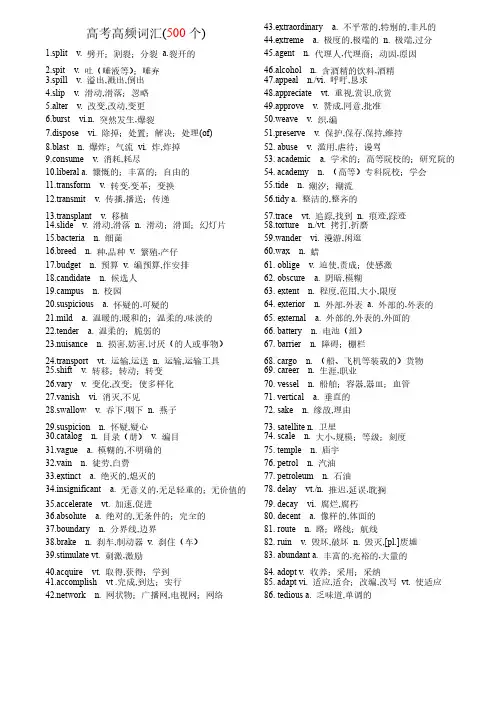
高考高频词汇(500个)1.split v. 劈开;割裂;分裂劈开;割裂;分裂 a.裂开的裂开的2.spit v. 吐(唾液等);唾弃;唾弃3.spill v. 溢出,溅出,倒出倒出4.slip v. 滑动,滑落;忽略滑落;忽略5.alter v. 改变,改动,变更变更6.burst vi.n. 突然发生,爆裂爆裂7.dispose vi. 除掉;处置;解决;处理(of)8.blast n. 爆炸;气流爆炸;气流 vi. 炸,炸掉炸掉9.consume v. 消耗,耗尽耗尽10.liberal a. 慷慨的;丰富的;自由的慷慨的;丰富的;自由的11.transform v. 转变,变革;变换变革;变换12.transmit v. 传播,播送;传递播送;传递13.transplant v. 移植移植14.slide v. 滑动,滑落滑落 n. 滑动;滑面;幻灯片滑动;滑面;幻灯片 15.bacteria n. 细菌细菌16.breed n. 种,品种品种 v. 繁殖,产仔产仔17.budget n. 预算预算 v. 编预算,作安排作安排18.candidate n. 候选人候选人19.campus n. 校园校园20.suspicious a. 怀疑的,可疑的可疑的d a. 温暖的,暖和的;温柔的,味淡的味淡的22.tender a. 温柔的;脆弱的温柔的;脆弱的23.nuisance n. 损害,妨害,讨厌(的人或事物)讨厌(的人或事物) 24.transport vt. 运输,运送运送 n. 运输,运输工具运输工具25.shift v. 转移;转动;转变转移;转动;转变26.vary v. 变化,改变;使多样化改变;使多样化27.vanish vi. 消灭,不见不见28.swallow v. 吞下,咽下咽下 n. 燕子燕子29.suspicion n. 怀疑,疑心疑心30.catalog n. 目录(册)目录(册) v. 编目编目31.vague a. 模糊的,不明确的不明确的32.vain n. 徒劳,白费白费33.extinct a. 绝灭的,熄灭的熄灭的34.insignificant a. 无意义的,无足轻重的;无足轻重的;无价值的无价值的无价值的 35.accelerate vt. 加速,促进促进36.absolute a. 绝对的,无条件的;完全的无条件的;完全的37.boundary n. 分界线,边界边界38.brake n. 刹车,制动器制动器 v. 刹住(车)刹住(车)39.stimulate vt. 刺激,激励激励40.acquire vt. 取得,获得;学到获得;学到41.accomplish vt .完成,到达;实行到达;实行work n. 网状物;广播网,电视网;网络电视网;网络 43.extraordinary a. 不平常的,特别的,非凡的非凡的 44.extreme a. 极度的,极端的极端的 n. 极端,过分过分 45.agent n. 代理人,代理商;动因,原因原因46.alcohol n. 含酒精的饮料,酒精酒精47.appeal n./vi. 呼吁,恳求恳求48.appreciate vt. 重视,赏识,欣赏欣赏49.approve v. 赞成,同意,批准批准50.weave v. 织,编51.preserve v. 保护,保存,保持,维持维持52. abuse v. 滥用,虐待;谩骂虐待;谩骂53. academic a. 学术的;高等院校的;研究院的学术的;高等院校的;研究院的 54. academy n. (高等)专科院校;学会(高等)专科院校;学会55.tide n. 潮汐;潮流潮汐;潮流56.tidy a. 整洁的,整齐的整齐的57.trace vt. 追踪,找到找到 n. 痕迹,踪迹踪迹58.torture n./vt. 拷打,折磨折磨59.wander vi. 漫游,闲逛闲逛60.wax n. 蜡61. oblige v. 迫使,责成;使感激责成;使感激62. obscure a. 阴暗,模糊模糊63. extent n. 程度,范围,大小,限度限度64. exterior n. 外部,外表外表 a. 外部的,外表的外表的 65. external a. 外部的,外表的,外面的外面的66. battery n. 电池(组)电池(组)67. barrier n. 障碍;棚栏障碍;棚栏68. cargo n. (船、飞机等装载的)货物(船、飞机等装载的)货物69. career n. 生涯,职业职业70. vessel n. 船舶;容器,器皿;血管器皿;血管71. vertical a. 垂直的垂直的72. sake n. 缘故,理由理由73. satellite n. 卫星卫星74. scale n. 大小,规模;等级;刻度规模;等级;刻度75. temple n. 庙宇庙宇76. petrol n. 汽油汽油77. petroleum n. 石油石油78. delay vt./n. 推迟,延误,耽搁耽搁79. decay vi. 腐烂,腐朽腐朽80. decent a. 像样的,体面的体面的81. route n. 路;路线;航线路;路线;航线82. ruin v. 毁坏,破坏破坏 n. 毁灭,[pl.]废墟废墟83. abundant a. 丰富的,充裕的,大量的大量的84. adopt v. 收养;采用;采纳收养;采用;采纳85. adapt vi. 适应,适合;改编,改写改写 vt. 使适应使适应 86. tedious a. 乏味道,单调的单调的87. tend vi.易于,趋向趋向88. tendency n.趋向,趋势趋势89. ultimate a. 极端的,最大的,最终的最终的 n. 极端极端90. undergo v. 经历,遭受遭受98. vacuum n. 真空,真空吸尘器真空吸尘器99. oral a. 口头的,口述的,口的口的100. optics n. (单、复数同形)光学(单、复数同形)光学94. bachelor n. 学士,学士学位;单身汉学士学位;单身汉95. casual a. 偶然的,碰巧的;临时的;非正式的碰巧的;临时的;非正式的 96. trap n. 陷阱,圈套圈套 v. 设陷阱捕捉设陷阱捕捉97. vacant a. 空的,未占用的未占用的107. expensive a. 花钱多的;价格高贵的花钱多的;价格高贵的108. expand v. 扩大,扩张;展开,膨胀膨胀109. expansion n. 扩大,扩充;发展,膨胀膨胀110. private a. 个人的个人的111. individual a. 个别的,单独的单独的 n. 个人,个体个体 101. organ n. 风琴风琴102. excess n. 过分,过量,过剩过剩103. expel v. 驱逐,开除,赶出赶出104. expend v. 消费消费105. expenditure n. 支出,消费;经费消费;经费106. expense n. 开销,费用费用119. grant vt. 授予,同意,准予准予119. grand a. 宏伟大,壮丽的,重大的重大的120. invade v. 侵入,入侵侵入,入侵 干扰干扰121. acid n. 酸,酸性物质酸性物质 a. 酸的;尖刻的酸的;尖刻的122. acknowledge v. 承认;致谢承认;致谢112. personal a. 个人的;亲自的个人的;亲自的114. personnel n. [总称]人员,员工;员工;115. the Pacific Ocean 太平洋太平洋116. the Atlantic Ocean 大西洋大西洋117. the Arctic Ocean118. the Antarctic Ocean128. outstanding a. 杰出的,地位显著的引人注目的杰出的,地位显著的引人注目的 129. export n. vt vi 出口出口 输出输出130. import n. 进口进口 输入输入131. impose vt. 把..强加强加 强迫强迫 利用利用 占便宜占便宜123. balcony n. 阳台阳台124. calculate vt. 计算,核算核算125. calendar n. 日历,月历月历126. optimistic a. 乐观乐观127. optional a. 可选择的可选择的132. religion n. 宗教,宗教信仰宗教,宗教信仰 139. interfere vi 干预,妨碍.140. internal a. 内部的内部的 国内的国内的141. beforehand ad. 预先,事先事先142. racial a. 宗族宗族 宗族之间的宗族之间的143. radiation n. 辐射,放射辐射,放射133. religious a. 宗教的,虔诚的宗教的,虔诚的 谨慎谨慎 认真的认真的 134. victim n. 牺牲者牺牲者 受害者受害者135. video n. 录像机录像机 录像录像136. videotape n. 录像磁带录像磁带137. offend v. 触怒,冒犯,犯规触怒,冒犯,犯规138. bother vt vi 打扰打扰 烦扰,使恼怒烦扰,使恼怒150. hook n. 钩 vt. 钩住钩住151. adequate a. 适当地;足够适当地;足够152. adhere vi. 粘附,附着;遵守,坚持坚持153. ban vt. 取缔,查封取缔,查封 禁止禁止154. capture vt. 俘获,夺取,占领俘获,夺取,占领144. radical a. 根本的,基本的根本的,基本的145. range n. 幅度,范围范围 v. (在某范围内)变动(在某范围内)变动 146. wonder n. 惊叹惊叹 ,惊奇,惊奇147. isolate vt. 使隔离,使孤立使孤立148. issue n. 问题,争论问题,争论 焦点焦点149. hollow a. 空的,中空的,空虚道空虚道162. explore v. 勘探勘探163. explosion n.激增激增164. explosive a. 极易引起争论的极易引起争论的165. remote a. 遥远的,偏僻的偏僻的166. removal n. 除去,消除消除167. render vt. 使得,致使致使155. valid a. 有效的,有根据的;正当的有根据的;正当的156. valley n. 山谷,峡谷峡谷157. consistent a. 坚固定;一致的,始终如一的始终如一的 158. continuous a. 继续的,连续(不断)的连续(不断)的 159. continual a. 不断地,频繁的频繁的160. explode v. 爆发;激增爆发;激增161. exploit v. 剥削;利用,开采开采174. resolve vt. 解决;决定,决意决意175. barrel n. 桶176. bargain n.177. coarse a.178. coach n.179. code n.180. coil n.167. render vt.168. precaution n. 预防,防备,警惕警惕169. idle a. 懒散的,无所事事的无所事事的170. identify vt. 认出,鉴定鉴定171. identify n. 身份;个性,特性特性 172. poverty n. 贫穷贫穷173. resistant a. (to)抵抗的,抗...的,耐...的 190. enclose vt.191. encounter vt./n.192. globe n.193. global a.194. scan vt.195. scandal n.196. significance n.197. subsequent a.198. virtue n.199. virtual a.181. adult n.182. advertise v.183. advertisement n.184. agency n.185. focus v.186. forbid vt.187. debate n./v. 辩188. debt n.189. decade n.208. emphasize vt. 强调,着重着重209. emotion n. 情感,感情感情210. emotional a. 感情的,情绪(上)的情绪(上)的 211. awful a. 极坏的,威严的,可怕的可怕的 212. awkward a. 笨拙的,棘手的棘手的213. clue n. 线索,提示提示214. collision n. 碰撞,冲突冲突215. device n. 装置,设备设备216. devise vt. 发明,策划,想出想出201. portion n. 一部分一部分202. target n. 目标,靶子靶子 vt. 瞄准瞄准 203. portable a. 手提式的手提式的204. decline v. 拒绝,谢绝;下降谢绝;下降205. illusion n. 错觉错觉206. likelihood n. 可能,可能性可能性207. stripe n. 条纹条纹217. inevitable a. 不可避免的不可避免的218. naval a. 海军的海军的219. navigation n. 航行航行 227. discrimination n. 歧视;辨别力歧视;辨别力228. professional a. 职业的,专门的专门的229. secure a. 安全的,可靠的可靠的230. security n. 安全,保障保障231. scratch v./n. 抓,搔,扒232. talent n. 才能,天资;人才天资;人才220. necessity n. 必需品;必要性必需品;必要性221. previous a. 先,前,以前的以前的222. provision n. [pl.]给养,口粮;准备,设备,装置装置 223. pursue vt. 追逐;追求;从事,进行进行224. stale a. 不新鲜的,陈腐的陈腐的225. substitute n. 代用品代用品 vt. 代替代替226. deserve vt. 应受,应得,值得值得239. medium a. 中等的,适中的适中的 n. 媒介物,新闻媒介新闻媒介 240. media n. 新闻传媒新闻传媒241. auxiliary a. 辅助的,备用的备用的242. automatic a. 自动的自动的243. compete vi. 竞争,比赛比赛244. competent a. 有能力的,能胜任的能胜任的245. competition n. 竞争,比赛比赛246. distribute vt. 分发分发233. insurance n. 保险,保险费保险费234. insure vt. 给保险,保证,确保确保235. nevertheless ad. 仍然,然而,不过不过236. neutral a. 中立的,中性的中性的237. spot n. 地点;斑点地点;斑点 vt. 认出,发现;玷污发现;玷污 238. spray v. 喷,(使)溅散(使)溅散254. register v./n.登记,注册注册255. stable a. 稳定的稳定的256. sophisticated a. 老于世故的,老练的;很复杂的老练的;很复杂的 257. splendid a. 极好的,壮丽的,辉煌的辉煌的258. cancel vt. 取消,废除废除259. variable a. 易变的,可变的可变的260. prospect n. 前景,前途;景象前途;景象247. disturb vt. 打搅,妨碍妨碍248. infer v. 推论,推断推断249. integrate v.(使)成为一体,(使)合并(使)合并250. moist a. 潮湿潮湿251. moisture n. 潮湿潮湿252. promote vt. 促进;提升促进;提升253. region n. 地区;范围;幅度地区;范围;幅度266. mainland n. 大陆大陆267. discipline n. 纪律;惩罚;学科纪律;惩罚;学科268. domestic a. 本国的,国内的;家用的;家庭的国内的;家用的;家庭的269. constant a. 不变的,恒定的恒定的 n. 常数常数270. cliff n. 悬崖,峭壁峭壁271. authority n. 权威;当局权威;当局272. audio a. 听觉听觉273. attitude n. 态度态度274. community n. 社区,社会社会261. prosperity n.兴旺,繁荣繁荣262. aspect n. 方面;朝向;面貌方面;朝向;面貌263. cope vi. (with)(成功地)应付,处理处理264. core n. 果心,核心核心265. maintain vt. 维持,保持;坚持,主张主张275. commit vt.犯(错误,罪行等),干(坏事等)干(坏事等) 283. moral a. 道德上的,有道德的有道德的284. prominent a. 突出的突出的285. substance n. 物质;实质物质;实质286. substantial a. 可观的;牢固的;实质的可观的;牢固的;实质的 287. prompt vt. 促使促使 a. 敏捷的,及时的及时的288. vivid a. 生动的生动的289. vocabulary n. 词汇(量);词汇表;词汇表276. comment n./vt. 评论评论277. distinguish vt. 区分,辨别辨别278. distress n. 痛苦,悲伤悲伤 vt. 使痛苦使痛苦279. facility n. [pl.] 设备,设施;便利,方便方便280. faculty n.能力,技能;系,学科/院;全体教员全体教员 281. mixture n. 混合,混合物混合物282. mood n. 心情,情绪;语气情绪;语气296. zone n. 地区,区域区域297. strategy n. 战略,策略策略298. strategic a. 战略(上)的,关键的关键的299. tense a. 紧张的紧张的 v. 拉紧拉紧 n. 时态时态300. tension n. 紧张(状态),张力张力290. venture n. 风险投资,风险项目风险项目 v. 冒险;取于冒险;取于 291. version n. 版本,译本;说法译本;说法292. waist n. 腰,腰部腰部293. weld v./n. 焊接焊接294. yawn vi. 打哈欠打哈欠295. yield vi. (to)屈服于;让出,放弃放弃 n. 产量产量304. comparative a. 比较的,相对的相对的305. dash vi. 猛冲,飞奔飞奔301. avenue n. 林荫道,大街大街302. available a. 现成可用的;可得到的现成可用的;可得到的303. comparable a. (with,to)可比较的,类似的类似的 306. data n. 数据,资料资料 312. exaggerate v. 夸大,夸张夸张313. evil a. 邪恶的,坏的坏的314. shrink vi. 起皱,收缩;退缩收缩;退缩315. subtract v. 减(去)减(去)316. suburb n. 市郊市郊307. dive vi. 跳水,潜水潜水308. diverse a. 不同的,多种多样的多种多样的309. entitle vt. 给...权利,给...资格资格310. regulate vt. 管理,调节调节311. release vt./n. 释放,排放;解释解脱排放;解释解脱 323. profitable a. 有利可图的有利可图的324. slope n. 斜坡,斜面斜面325. reinforce vt. 增强,加强加强326. reject vt. 拒绝拒绝327. fatal a. 致命的;重大的致命的;重大的317. subway n. 地铁地铁318. survey n./vt. 调查,勘测勘测319. wealthy a. 富裕的富裕的320. adjust v. 调整,调节调节321. attach vt. 系,贴;使附属贴;使附属322. profit n. 利润,益处;v. 有益于,有利于有利于 336. dump vt. 倾卸,倾倒倾倒337. deaf a. 聋的;不愿听的聋的;不愿听的338. decorate vt. 装饰,装璜装璜339. principal a. 最重要的最重要的 n. 负责人,校长校长 340. principle n. 原则,原理原理341. prior a. 优先的,在前的在前的342. priority n. 优先,重点重点328. fate n. 命运命运329. humble a. 谦逊的;谦虚的谦逊的;谦虚的330. illegal a. 不合法的,非法的非法的331. award vt. 授予,判给判给 n. 奖品,奖金奖金 332. aware a. 意识到意识到333. column n. 柱,圆柱;栏,专栏专栏334. comedy n. 喜剧喜剧335. dumb a. 哑的;沉默的哑的;沉默的348. undertake vt. 承担,着手做;同意,答应答应 349. unique a. 唯一的,独特的独特的350. obstacle n. 障碍(物),妨碍妨碍351. odd a. 奇特的,古怪的;奇数的古怪的;奇数的352. omit vt. 省略省略353. opponent n. 敌手,对手对手343. prohibit vt. 禁止,不准不准344. remarkable a. 值得注意的,异常的,非凡的非凡的345. remedy n./vt. 补救,医治,治疗治疗346. repetition n. 重复,反复反复347. vain a. 徒劳的,无效的无效的361. approximate a. 大概的,大约大约 v. 近似近似 362. arbitrary a. 随意的,未断的未断的363. architect n. 建筑师建筑师364. architecture n. 建筑学建筑学365. biology n. 生物学生物学366. geography n. 地理(学)地理(学)367. geology n. 地质学地质学354. opportunity n. 机会,时机时机355. orchestra n. 管弦乐队管弦乐队356. semester n. 学期;半年学期;半年357. semiconductor n. 半导体半导体358. seminar n. 研讨会研讨会359. terminal a. 末端的,极限的极限的 n. 终点终点 360. territory n. 领土领土375. episode n. 插曲,片段片段376. equation n. 方程(式)方程(式)377. restrain vt. 阻止,抑制抑制378. restraint n. 抑制,限制限制379. resume v. (中断后)重新开始(中断后)重新开始380. severe a. 严重的严重的368. geometry n. 几何(学)几何(学)369. arithmetic n. 算术算术370. algebra n. 代数代数371. entertainment n. 娱乐;招待,款待款待372. enthusiasm n. 热情,热心热心373. entry n. 进入,入口处;参赛的人(或物)入口处;参赛的人(或物) 374. environment n. 环境环境389. thrust v. 挤,推,插390. treaty n. 条约,协定协定391. arise vi. 产生,出现,发生;起身发生;起身392. arouse vt. 引起,激起;唤醒激起;唤醒393. burden n. 重担,负荷负荷381. sexual a. 性的性的382. simplicity n. 简单;朴素简单;朴素383. simplify vt. 简化简化384. sorrow n. 悲哀,悲痛悲痛385. stuff n. 原料,材料材料 vt. 填进,塞满塞满386. temporary a. 暂时的,临时的临时的387. temptation n. 诱惑,引诱引诱388. terror n. 恐怖恐怖394. bureau n. 局,办事处办事处 400. nonsense n. 胡说,冒失的行动冒失的行动301. avenue n. 林荫道,大街大街302. available a. 现成可用的;可得到的现成可用的;可得到的 303. comparable a. (with,to)可比较的,类似的类似的 395. marvelous a. 奇迹般的,惊人的惊人的396. massive a. 大的,大量的,大块的大块的397. mature a. 成熟的成熟的398. maximum a. 最高的,最大的最大的399. minimum a. 最低的,最小的最小的310. regulate vt. 管理,调节调节311. release vt./n. 释放,排放;解释解脱排放;解释解脱 312. exaggerate v. 夸大,夸张夸张313. evil a. 邪恶的,坏的坏的314. shrink vi. 起皱,收缩;退缩收缩;退缩304. comparative a. 比较的,相对的相对的305. dash vi. 猛冲,飞奔飞奔306. data n. 数据,资料资料307. dive vi. 跳水,潜水潜水308. diverse a. 不同的,多种多样的多种多样的309. entitle vt. 给...权利,给...资格资格320. adjust v. 调整,调节调节321. attach vt. 系,贴;使附属贴;使附属322. profit n. 利润,益处;v. 有益于,有利于有利于 323. profitable a. 有利可图的有利可图的324. slope n. 斜坡,斜面斜面325. reinforce vt. 增强,加强加强315. subtract v. 减(去)减(去)316. suburb n. 市郊市郊317. subway n. 地铁地铁318. survey n./vt. 调查,勘测勘测319. wealthy a. 富裕的富裕的332. aware a. 意识到意识到333. column n. 柱,圆柱;栏,专栏专栏334. comedy n. 喜剧喜剧335. dumb a. 哑的;沉默的哑的;沉默的336. dump vt. 倾卸,倾倒倾倒326. reject vt. 拒绝拒绝327. fatal a. 致命的;重大的致命的;重大的328. fate n. 命运命运329. humble a. 谦逊的;谦虚的谦逊的;谦虚的330. illegal a. 不合法的,非法的非法的331. award vt. 授予,判给判给 n. 奖品,奖金奖金 337. deaf a. 聋的;不愿听的聋的;不愿听的344. remarkable a. 值得注意的,异常的,非凡的非凡的 345. remedy n./vt. 补救,医治,治疗治疗346. repetition n. 重复,反复反复347. vain a. 徒劳的,无效的无效的348. undertake vt. 承担,着手做;同意,答应答应 349. unique a. 唯一的,独特的独特的350. obstacle n. 障碍(物),妨碍妨碍338. decorate vt. 装饰,装璜装璜339. principal a. 最重要的最重要的 n. 负责人,校长校长 340. principle n. 原则,原理原理341. prior a. 优先的,在前的在前的342. priority n. 优先,重点重点343. prohibit vt. 禁止,不准不准359. terminal a. 末端的,极限的极限的 n. 终点终点 360. territory n. 领土领土361. approximate a. 大概的,大约大约 v. 近似近似 362. arbitrary a. 随意的,未断的未断的363. architect n. 建筑师建筑师351. odd a. 奇特的,古怪的;奇数的古怪的;奇数的352. omit vt. 省略省略353. opponent n. 敌手,对手对手354. opportunity n. 机会,时机时机355. orchestra n. 管弦乐队管弦乐队356. semester n. 学期;半年学期;半年357. semiconductor n. 半导体半导体358. seminar n. 研讨会研讨会370. algebra n. 代数代数371. entertainment n. 娱乐;招待,款待款待372. enthusiasm n. 热情,热心热心373. entry n. 进入,入口处;参赛的人(或物)入口处;参赛的人(或物) 364. architecture n. 建筑学建筑学365. biology n. 生物学生物学366. geography n. 地理(学)地理(学)367. geology n. 地质学地质学368. geometry n. 几何(学)几何(学)369. arithmetic n. 算术算术378. restraint n. 抑制,限制限制379. resume v. (中断后)重新开始(中断后)重新开始380. severe a. 严重的严重的374. environment n. 环境环境375. episode n. 插曲,片段片段376. equation n. 方程(式)方程(式)377. restrain vt. 阻止,抑制抑制381. sexual a. 性的性的 389. thrust v. 挤,推,插390. treaty n. 条约,协定协定391. arise vi. 产生,出现,发生;起身发生;起身 392. arouse vt. 引起,激起;唤醒激起;唤醒 393. burden n. 重担,负荷负荷394. bureau n. 局,办事处办事处3382. simplicity n. 简单;朴素简单;朴素 383. simplify vt. 简化简化384. sorrow n. 悲哀,悲痛悲痛385. stuff n. 原料,材料材料 vt. 填进,塞满塞满 386. temporary a. 暂时的,临时的临时的 387. temptation n. 诱惑,引诱引诱388. terror n. 恐怖恐怖398. maximum a. 最高的,最大的最大的 399. minimum a. 最低的,最小的最小的 95. marvelous a. 奇迹般的,惊人的惊人的 396. massive a. 大的,大量的,大块的大块的 397. mature a. 成熟的成熟的400. nonsense n. 胡说,冒失的行动冒失的行动。
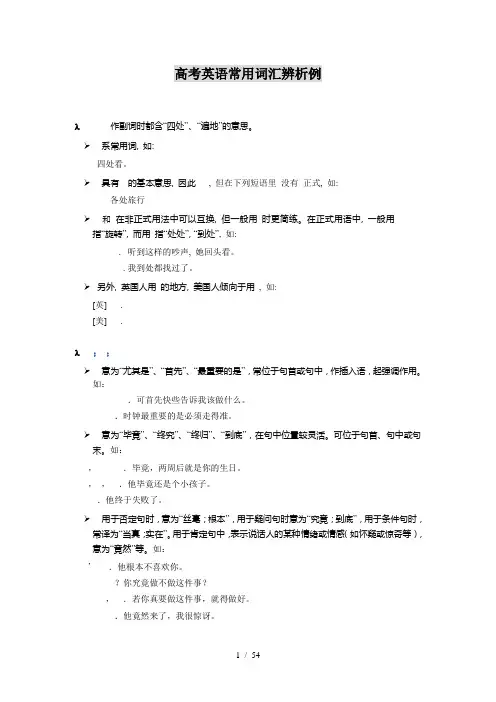
高考英语常用词汇辨析例λ作副词时都含“四处”、“遍地”的意思。
系常用词, 如:四处看。
具有的基本意思, 因此, 但在下列短语里没有正式, 如:各处旅行和在非正式用法中可以互换, 但一般用时更简练。
在正式用语中, 一般用指“旋转”, 而用指“处处”, “到处”, 如:. 听到这样的吵声, 她回头看。
. 我到处都找过了。
另外, 英国人用的地方, 美国人倾向于用, 如:[英] .[美] .λ;;意为“尤其是”、“首先”、“最重要的是”,常位于句首或句中,作插入语,起强调作用。
如:.可首先快些告诉我该做什么。
.时钟最重要的是必须走得准。
意为“毕竟”、“终究”、“终归”、“到底”,在句中位置较灵活。
可位于句首、句中或句末。
如:,.毕竟,两周后就是你的生日。
,,.他毕竟还是个小孩子。
.他终于失败了。
用于否定句时,意为“丝毫;根本”,用于疑问句时意为“究竟;到底”,用于条件句时,常译为“当真;实在”。
用于肯定句中,表示说话人的某种情绪或情感(如怀疑或惊奇等),意为“竟然”等。
如:’ .他根本不喜欢你。
?你究竟做不做这件事?,.若你真要做这件事,就得做好。
.他竟然来了,我很惊讶。
λ; ; …;作“加,增加”解时,既可作及物动词,又可用作不及物动词;作“又说,补充说”解时,与直接或间接引语连用。
如:, .如果茶太浓了,再加点开水。
, .过了一会儿,他又接着说他会尽力。
意为“增添,增加,增进”。
如:.恶劣的天气增加了我们的困难。
...意为“把……加到……”,是把前一项加到后一项之后或之中。
如:, .七加二等于九。
意为“加起来总共是/累计得”,该短语不用于被动语态。
如:.他的学校教育加起来不过一年。
λ; ; ;意为“事情、事件”, 含义较广,泛指已做或待做的事;复数一般指商业事务及政府的日常事务,如财政管理、外交事务等。
意为“事情、事物”,不管大事小事、好事坏事均称为,一般不能专指事务;复数还可作“形势”解。
侧重指须留心的要事或问题、难题。
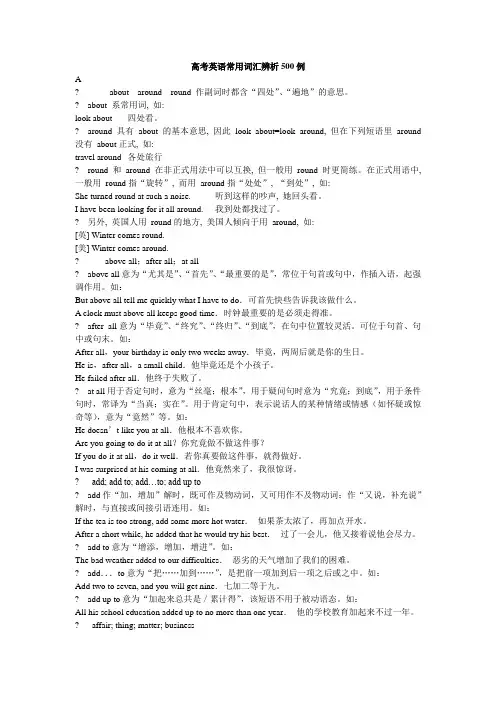
高考英语常用词汇辨析500例A? about around round 作副词时都含“四处”、“遍地”的意思。
? about 系常用词, 如:look about 四处看。
? around 具有about 的基本意思, 因此look about=look around, 但在下列短语里around 没有about正式, 如:travel around 各处旅行? round 和around在非正式用法中可以互换, 但一般用round时更简练。
在正式用语中, 一般用round指“旋转”, 而用around指“处处”, “到处”, 如:She turned round at such a noise. 听到这样的吵声, 她回头看。
I have been looking for it all around. 我到处都找过了。
? 另外, 英国人用round的地方, 美国人倾向于用around, 如:[英] Winter comes round.[美] Winter comes around.? above all;after all;at all? above all意为“尤其是”、“首先”、“最重要的是”,常位于句首或句中,作插入语,起强调作用。
如:But above all tell me quickly what I have to do.可首先快些告诉我该做什么。
A clock must above all keeps good time.时钟最重要的是必须走得准。
? after all意为“毕竟”、“终究”、“终归”、“到底”,在句中位置较灵活。
可位于句首、句中或句末。
如:After all,your birthday is only two weeks away.毕竟,两周后就是你的生日。
He is,after all,a small child.他毕竟还是个小孩子。
He failed after all.他终于失败了。
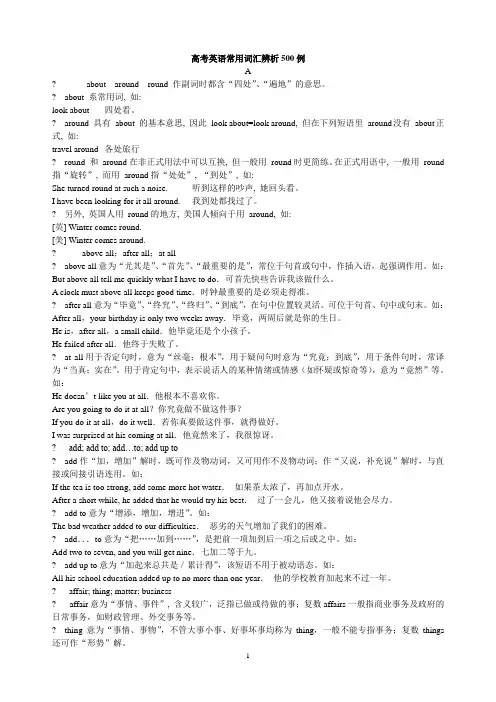
高考英语常用词汇辨析500例A? about around round 作副词时都含“四处”、“遍地”的意思。
? about 系常用词, 如:look about 四处看。
? around 具有about 的基本意思, 因此look about=look around, 但在下列短语里around没有about正式, 如:travel around 各处旅行? round 和around在非正式用法中可以互换, 但一般用round时更简练。
在正式用语中, 一般用round 指“旋转”, 而用around指“处处”, “到处”, 如:She turned round at such a noise. 听到这样的吵声, 她回头看。
I have been looking for it all around. 我到处都找过了。
? 另外, 英国人用round的地方, 美国人倾向于用around, 如:[英] Winter comes round.[美] Winter comes around.? above all;after all;at all? above all意为“尤其是”、“首先”、“最重要的是”,常位于句首或句中,作插入语,起强调作用。
如:But above all tell me quickly what I have to do.可首先快些告诉我该做什么。
A clock must above all keeps good time.时钟最重要的是必须走得准。
? after all意为“毕竟”、“终究”、“终归”、“到底”,在句中位置较灵活。
可位于句首、句中或句末。
如:After all,your birthday is only two weeks away.毕竟,两周后就是你的生日。
He is,after all,a small child.他毕竟还是个小孩子。
He failed after all.他终于失败了。
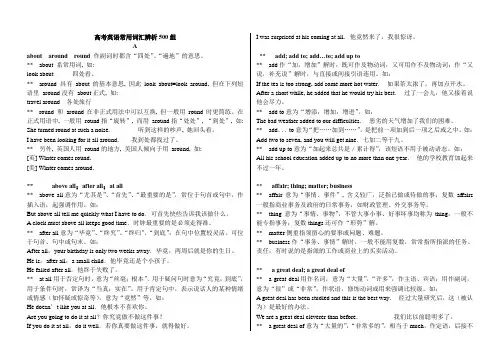
高考英语常用词汇辨析500组Aabout around round 作副词时都含“四处”、“遍地”的意思。
** about 系常用词, 如:look about 四处看。
** around 具有about 的基本意思, 因此look about=look around, 但在下列短语里around没有about正式, 如:travel around 各处旅行** round 和around在非正式用法中可以互换, 但一般用round时更简练。
在正式用语中, 一般用round指“旋转”, 而用around指“处处”, “到处”, 如: She turned round at such a noise. 听到这样的吵声, 她回头看。
I have been looking for it all around. 我到处都找过了。
** 另外, 英国人用round的地方, 美国人倾向于用around, 如:[英] Winter comes round.[美] Winter comes around.** above all;after all;at all** above all意为“尤其是”、“首先”、“最重要的是”,常位于句首或句中,作插入语,起强调作用。
如:But above all tell me quickly what I have to do.可首先快些告诉我该做什么。
A clock must above all keeps good time.时钟最重要的是必须走得准。
** after all意为“毕竟”、“终究”、“终归”、“到底”,在句中位置较灵活。
可位于句首、句中或句末。
如:After all,your birthday is only two weeks away.毕竟,两周后就是你的生日。
He is,after all,a small child.他毕竟还是个小孩子。
He failed after all.他终于失败了。
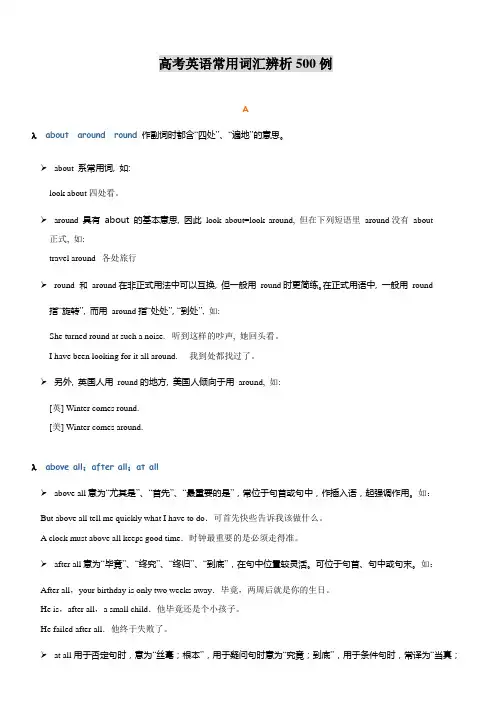
高考英语常用词汇辨析500例Aλabout around round作副词时都含“四处”、“遍地”的意思。
about 系常用词, 如:look about四处看。
around 具有about 的基本意思, 因此look about=look around, 但在下列短语里around没有about正式, 如:travel around 各处旅行round 和around在非正式用法中可以互换, 但一般用round时更简练。
在正式用语中, 一般用round指“旋转”, 而用around指“处处”, “到处”, 如:She turned round at such a noise. 听到这样的吵声, 她回头看。
I have been looking for it all around. 我到处都找过了。
另外, 英国人用round的地方, 美国人倾向于用around, 如:[英] Winter comes round.[美] Winter comes around.λabove all;after all;at allabove all意为“尤其是”、“首先”、“最重要的是”,常位于句首或句中,作插入语,起强调作用。
如:But above all tell me quickly what I have to do.可首先快些告诉我该做什么。
A clock must above all keeps good time.时钟最重要的是必须走得准。
after all意为“毕竟”、“终究”、“终归”、“到底”,在句中位置较灵活。
可位于句首、句中或句末。
如:After all,your birthday is only two weeks away.毕竟,两周后就是你的生日。
He is,after all,a small child.他毕竟还是个小孩子。
He failed after all.他终于失败了。
at all用于否定句时,意为“丝毫;根本”,用于疑问句时意为“究竟;到底”,用于条件句时,常译为“当真;实在”。
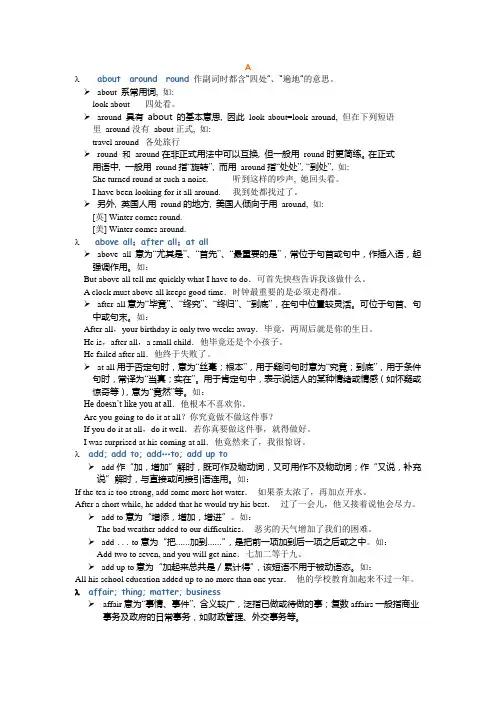
Aλabout around round作副词时都含“四处”、“遍地”的意思。
about 系常用词, 如:look about 四处看。
around 具有 about 的基本意思, 因此look about=look around, 但在下列短语里around没有about正式, 如:travel around 各处旅行round 和around在非正式用法中可以互换, 但一般用round时更简练。
在正式用语中, 一般用round指“旋转”, 而用around指“处处”, “到处”, 如:She turned round at such a noise. 听到这样的吵声, 她回头看。
I have been looking for it all around. 我到处都找过了。
另外, 英国人用round的地方, 美国人倾向于用around, 如:[英] Winter comes round.[美] Winter comes around.λabove all;after all;at allabove all意为“尤其是”、“首先”、“最重要的是”,常位于句首或句中,作插入语,起强调作用。
如:But above all tell me quickly what I have to do.可首先快些告诉我该做什么。
A clock must above all keeps good time.时钟最重要的是必须走得准。
after all意为“毕竟”、“终究”、“终归”、“到底”,在句中位臵较灵活。
可位于句首、句中或句末。
如:After all,your birthday is only two weeks away.毕竟,两周后就是你的生日。
He is,after all,a small child.他毕竟还是个小孩子。
He failed after all.他终于失败了。
at all用于否定句时,意为“丝毫;根本”,用于疑问句时意为“究竟;到底”,用于条件句时,常译为“当真;实在”。
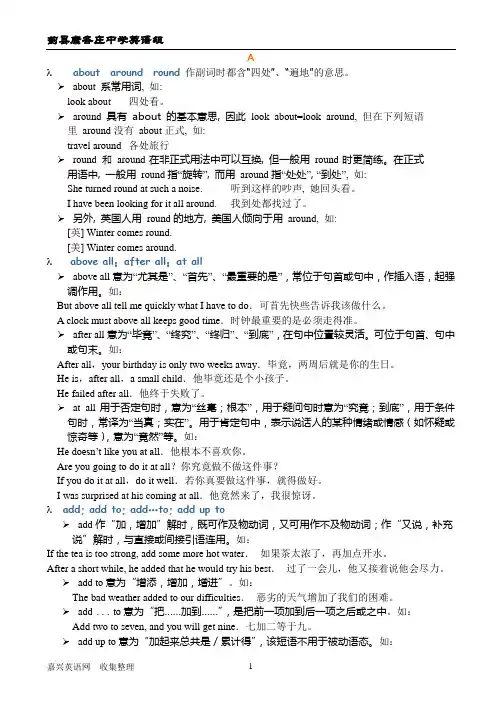
Aλabout around round作副词时都含“四处”、“遍地”的意思。
about 系常用词, 如:look about 四处看。
around 具有 about 的基本意思, 因此look about=look around, 但在下列短语里around没有about正式, 如:travel around 各处旅行round 和around在非正式用法中可以互换, 但一般用round时更简练。
在正式用语中, 一般用round指“旋转”, 而用around指“处处”, “到处”, 如:She turned round at such a noise. 听到这样的吵声, 她回头看。
I have been looking for it all around. 我到处都找过了。
另外, 英国人用round的地方, 美国人倾向于用around, 如:[英] Winter comes round.[美] Winter comes around.λabove all;after all;at allabove all意为“尤其是”、“首先”、“最重要的是”,常位于句首或句中,作插入语,起强调作用。
如:But above all tell me quickly what I have to do.可首先快些告诉我该做什么。
A clock must above all keeps good time.时钟最重要的是必须走得准。
after all意为“毕竟”、“终究”、“终归”、“到底”,在句中位臵较灵活。
可位于句首、句中或句末。
如:After all,your birthday is only two weeks away.毕竟,两周后就是你的生日。
He is,after all,a small child.他毕竟还是个小孩子。
He failed after all.他终于失败了。
at all用于否定句时,意为“丝毫;根本”,用于疑问句时意为“究竟;到底”,用于条件句时,常译为“当真;实在”。
高考英语常用词汇辨析500组Aabout around round 作副词时都含“四处”、“遍地”的意思。
about 系常用词, 如:look about 四处看。
around 具有 about 的基本意思, 因此 look about=look around, 但在下列短语里 around没有 about正式, 如:travel around 各处旅行round 和 around在非正式用法中可以互换, 但一般用 round时更简练。
在正式用语中, 一般用 round指“旋转”, 而用 around指“处处”, “到处”, 如: She turned round at such a noise. 听到这样的吵声, 她回头看。
I have been looking for it all around. 我到处都找过了。
另外, 英国人用 round的地方, 美国人倾向于用 around, 如:[英] Winter comes round.[美] Winter comes around.above all;after all;at allabove all意为“尤其是”、“首先”、“最重要的是”,常位于句首或句中,作插入语,起强调作用。
如:But above all tell me quickly what I have to do.可首先快些告诉我该做什么。
A clock must above all keeps good time.时钟最重要的是必须走得准。
after all意为“毕竟”、“终究”、“终归”、“到底”,在句中位置较灵活。
可位于句首、句中或句末。
如:After all,your birthday is only two weeks away.毕竟,两周后就是你的生日。
He is,after all,a small child.他毕竟还是个小孩子。
He failed after all.他终于失败了。
高考英语常用词汇辨析500组目录A ..............................................................................................1、 about around round 作副词时都含“四处”、“遍地”的意思。
.............................2、 above all;after all;at all ............................................................3、add; add to; add…to; add up to........................................................4、 affair; thing; matter; business ........................................................5、 a great deal; a great deal of ...........................................................6、 agree on;agree to;agree with;agree that ..............................................7、allow;let 二者均可作“允许”解,但各有侧重: .........................................8、although; though; as .....................................................................9、among/between ...........................................................................10、 argue debate dispute 都含“辩论”的意思。
高考英语常用词汇辨析500例Aλabout around round作副词时都含“四处”、“遍地”的意思。
about 系常用词, 如:look about四处看。
around 具有 about 的基本意思, 因此look about=look around, 但在下列短语里around没有about正式, 如:travel around 各处旅行round 和around在非正式用法中可以互换, 但一般用round时更简练。
在正式用语中, 一般用round指“旋转”, 而用around指“处处”, “到处”, 如:She turned round at such a noise. 听到这样的吵声, 她回头看。
I have been looking for it all around. 我到处都找过了。
另外, 英国人用round的地方, 美国人倾向于用around, 如:[英] Winter comes round.[美] Winter comes around.λabove all;after all;at allabove all意为“尤其是”、“首先”、“最重要的是”,常位于句首或句中,作插入语,起强调作用。
如:But above all tell me quickly what I have to do.可首先快些告诉我该做什么。
A clock must above all keeps good time.时钟最重要的是必须走得准。
after all意为“毕竟”、“终究”、“终归”、“到底”,在句中位臵较灵活。
可位于句首、句中或句末。
如:After all,your birthday is only two weeks away.毕竟,两周后就是你的生日。
He is,after all,a small child.他毕竟还是个小孩子。
He failed after all.他终于失败了。
at all用于否定句时,意为“丝毫;根本”,用于疑问句时意为“究竟;到底”,用于条件句时,常译为“当真;实在”。
高考英语常用词汇辨析500例A? about around round 作副词时都含“四处”、“遍地”的意思。
? about 系常用词, 如:look about 四处看。
? around 具有about 的基本意思, 因此look about=look around, 但在下列短语里around 没有about正式, 如:travel around 各处旅行? round 和around在非正式用法中可以互换, 但一般用round时更简练。
在正式用语中, 一般用round指“旋转”, 而用around指“处处”, “到处”, 如:She turned round at such a noise. 听到这样的吵声, 她回头看。
I have been looking for it all around. 我到处都找过了。
? 另外, 英国人用round的地方, 美国人倾向于用around, 如:[英] Winter comes round.[美] Winter comes around.? above all;after all;at all? above all意为“尤其是”、“首先”、“最重要的是”,常位于句首或句中,作插入语,起强调作用。
如:But above all tell me quickly what I have to do.可首先快些告诉我该做什么。
A clock must above all keeps good time.时钟最重要的是必须走得准。
? after all意为“毕竟”、“终究”、“终归”、“到底”,在句中位置较灵活。
可位于句首、句中或句末。
如:After all,your birthday is only two weeks away.毕竟,两周后就是你的生日。
He is,after all,a small child.他毕竟还是个小孩子。
He failed after all.他终于失败了。
高考英语常见熟词生义500词例释《新课程标准》,《普通高等学校招生全国统一考试说明》中的词汇表是命题人的主要依据,而这个词汇表只提供了英语单词或短语的拼写形式,未有词性和词义。
这就给命题人提供了广阔的活动空间,给他们减少了很多限制,但却给考生增加了数倍的难度。
因为英语中的一词多义多性现象是非常普遍存在的。
单选题如此,完形填空、阅读理解、阅读表达等题中熟词生义现象更是比比皆是。
为了能使我们广大考生顺利通过考试,我们根据《新课程标准》、《考试说明》的词汇表所列词汇,按照字母顺序逐一解析高考及平时考试中屡屡遇到的,使学生感到极为棘手的熟词生义。
A1. about:(熟义:关于)We spent the whole afternoon walking about town.prep.&adv.到处=(美)around2. absent 熟义:adj. 缺席的)He looked at me in an absent way. adj. 茫然的,恍惚的3. abuse 熟义:v 滥用,谩骂She is quite a successful career woman, but actually she's much abused at home. v. 虐待4. accept vt.&vi.①同意(接受别人的观点,看法)(熟义:接受)Tom accepted her explanation.汤姆同意她的解释。
②认可,领受,认为I accept that the aircraft has no choice but to crash into the sea.飞机只有坠入大海,别无他法,我只好认命了。
5. accommodate 熟义:住宿,留宿This hotel can accommodate more than 5oo guests. vt 容纳He accommodated me when I asked him for help. v. 准予,提供6. ache 熟义:v/n 疼痛He was aching for home. v. 渴望7. act vi.熟义:行动It takes a couple of minutes for the drug to act.(vi.起作用)只需几分钟,药物就起作用了。
高考英语常见熟词生义500词例释《新课程标准》,《普通高等学校招生全国统一考试说明》中的词汇表是命题人的主要依据,而这个词汇表只提供了英语单词或短语的拼写形式,未有词性和词义。
这就给命题人提供了广阔的活动空间,给他们减少了很多限制,但却给考生增加了数倍的难度。
因为英语中的一词多义多性现象是非常普遍存在的。
单选题如此,完形填空、阅读理解、阅读表达等题中熟词生义现象更是比比皆是。
为了能使我们广大考生顺利通过考试,我们根据《新课程标准》、《考试说明》的词汇表所列词汇,按照字母顺序逐一解析高考及平时考试中屡屡遇到的,使学生感到极为棘手的熟词生义。
A1. about:(熟义:关于)We spent the whole afternoon walking about town.prep.&adv.到处=(美)around2. absent 熟义:adj. 缺席的)He looked at me in an absent way. adj. 茫然的,恍惚的3. abuse 熟义:v 滥用,谩骂She is quite a successful career woman, but actually she's much abused at home. v. 虐待4. accept vt.&vi.①同意(接受别人的观点,看法)(熟义:接受)Tom accepted her explanation.汤姆同意她的解释。
②认可,领受,认为I accept that the aircraft has no choice but to crash into the sea.飞机只有坠入大海,别无他法,我只好认命了。
5. accommodate 熟义:住宿,留宿This hotel can accommodate more than 5oo guests. vt 容纳He accommodated me when I asked him for help. v. 准予,提供6. ache 熟义:v/n 疼痛He was aching for home. v. 渴望7. act vi.熟义:行动It takes a couple of minutes for the drug to act.(vi.起作用)只需几分钟,药物就起作用了。
高考英语常用词汇辨析500组[绝对精品]高考英语常用词汇辨析500组A——WAAabout around roundλ作副词时都含“四处”、“遍地”的意思。
about 系常用词, 如:⌝look about 四处看。
around⌝具有about 的基本意思, 因此look about=look around, 但在下列短语里around没有about正式, 如:travel around 各处旅行round 和around在非正式用法中可以互换, 但一般用⌝ round时更简练。
在正式用语中, 一般用round指“旋转”, 而用around指“处处”, “到处”, 如:She turned round at such a noise. 听到这样的吵声, 她回头看。
I have been looking for it all around. 我到处都找过了。
另外, 英国人用round的地方, 美国人倾向于用around, 如:⌝[英] Winter comes round.[美] Winter comes around.above all;afterλ all;at allabove all意为“尤其是”、“首先”、“最重要的是”,常位于句首或句中,作插入语,起强调作用。
如:⌝But above all tell me quickly what I have to do.可首先快些告诉我该做什么。
A clock must above all keeps good time.时钟最重要的是必须走得准。
after⌝ all意为“毕竟”、“终究”、“终归”、“到底”,在句中位置较灵活。
可位于句首、句中或句末。
如:After all,your birthday is only two weeks away.毕竟,两周后就是你的生日。
He is,after all,a small child.他毕竟还是个小孩子。
He failed after all.他终于失败了。
at⌝ all用于否定句时,意为“丝毫;根本”,用于疑问句时意为“究竟;到底”,用于条件句时,常译为“当真;实在”。
用于肯定句中,表示说话人的某种情绪或情感(如怀疑或惊奇等),意为“竟然”等。
如:He doesn’t like you at all.他根本不喜欢你。
Are you going to do it at all?你究竟做不做这件事?If you do it at all,do it well.若你真要做这件事,就得做好。
I was surprised at his coming at all.他竟然来了,我很惊讶。
add; add to; add…to; addλ up toadd作“加,增加”解时,既可作及物动词,又可用作不及物动词;作“又说,补充说”解时,与直接或间接引语连用。
如:⌝If the tea is too strong, add some more hot water.如果茶太浓了,再加点开水。
After a short while, he added that he would try his best.过了一会儿,他又接着说他会尽力。
add⌝ to意为“增添,增加,增进”。
如:The bad weather added to our difficulties.恶劣的天气增加了我们的困难。
add...to意为“把……加到……”,是把前一项加到后一项之后或之中。
如:⌝Add two to seven, and you will get nine.七加二等于九。
add up to意为“加起来总共是/累计得”,该短语不用于被动语态。
如:⌝All his school education added up to no more than one year.他的学校教育加起来不过一年。
affair;λ thing; matter; businessaffair意为“事情、事件”,⌝含义较广,泛指已做或待做的事;复数affairs一般指商业事务及政府的日常事务,如财政管理、外交事务等。
thing意为“事情、事物”,不管大事小事、好事坏事均称为thing,一般不能专指事务;复数things还可作“形势”解。
⌝matter侧重指须留心的要事或问题、难题。
⌝business作“事务、事情”解时,一般不能用复数,常常指所指派的任务、责任;有时说的是指派的工作或商业上的买卖活动。
⌝λ a great deal; a great deal ofa great⌝ deal用作名词,意为“大量”,“许多”,作主语、宾语;用作副词,意为“很”或“非常”,作状语,修饰动词或用来强调比较级。
如:A great deal has been studied and this is the best way.经过大量研究后,这(被认为)是最好的办法。
We are a great deal cleverer than before.我们比以前聪明多了。
a great deal⌝ of意为“大量的”,“非常多的”,相当于much,作定语,后接不可数名词。
如:A great deal of time/money/energy has been spent on the project.大量的时间/金钱/能源花在那个工程上了。
agreeλ on;agree to;agree with;agree thatagree on作“就……取得一致意见”解。
例如:⌝The building of a new car factory was agreed on last month.上月,就建一座新汽车厂之事达成了协议。
agree to有两层含义和用法:⌝⎫其一是to作为动词不定式符号,其后跟动词原形,作“同意(答应)做某事”解。
例如: My father agreed to buy a new pen for me.父亲答应给我买支新钢笔。
其二是to作为介词,之后跟表示“计划/条件/建议等一类的名词或代词”。
例如:⎫They have a greed to our plan.他们已同意我们的计划。
agree⌝ with作“同意某人的意见”解,其后可跟表示人的名词或代词,也可跟表示“意见”或“说的话”的名词或从句。
例如:He agreed with my opinions.他同意了我的意见。
We agreed with what he said at the meeting.我们同意他在会上讲的话。
agree that作“认为……”解,其后跟宾语从句。
例如:⌝I agree that your composition is very good.我认为你的这篇作文写得不错。
allow;let 二者均可作“允许”解,但各有侧重:λ allow重在“允许”或“容许”,也可表示客气的请求。
例如:He allowed me to take his⌝ dictionary.他允许我拿走他的词典。
Will you allow me to use your bike?我可以用你的自行车吗? let作“允许”或“让”解,主要用于口语,一般可与allow互换。
作“允许”解时,常暗含“听任”、“默许”之意;作“让”解时,常含“祈使”或“建议”之意。
注意:let之后作宾补的不定式不带to,且不可用于被动语态,而allow则相反。
例如:⌝ Please let me walk with you(=Please allow me to walk with you.).我(请允许我)跟你一起走。
注:allow常用于allow sb.to do sth.或allow doing sth.结构中。
λ although; though; as三者均可表示“尽管;虽然”,引导让步状语从句。
although用法较正式,语气较强;though 较常用;as则主要用于倒装句。
它们的用法有如下几点值得注意:状语从句由although, though或as引导,主句之前不可有but, and, so,⌝ however等并列连词,但可有yet或still等副词。
although与though常可互换。
例如:Although/Though he believes it, yet he will not act.他虽然相信它,但却不肯有所行动。
as表示“尽管;虽然”,只能用于倒装句,即:将表语、状语或谓语动词放在as之前。
though 也可这么用。
例如:⌝Young as/though he is, he knows a lot.他虽然年纪不大,却懂得很多。
注意:如果表语是单数名词,要省略a。
例如:Child as/though he is, he can speak two foreign languages.虽然他是个孩子,但他会说两门外语。
though可以放在句末,表示“但是”,although却不能。
例如:⌝They said they would come; they did not, though.他们说他们会来,可是他们并没有来。
although只用来陈述“事实”,不能表示“假设”。
因此可以说even⌝though“即使”以及as though“好像(=as if)”,不能说even although或as although。
例如:I believe you are on duty—even though you’re i n plain clothes.尽管你穿着便衣,我相信你是在值勤。
among/betweenλ这两个介词都有“在……之间”的意思。
between常用于两者之间;among一般指三者或三者以上之间。
若指三个以上人或物中的每两个之间时,仍然要用between。
例如:The girl walked between her father and mother.这个女孩走在她父亲和母亲之间。
She is the tallest among her classmates.她在她同学之间是最高的。
Switzerland lies between France,Italy,Austria and Germany.瑞士位于法国、意大利、奥地利和德国之间。
λ argue debate dispute 都含“辩论”的意思。
argue 着重“说理”、“论证”和“企图说服”, 如:⌝I argued with her for a long time, but she refused to listen to reason.我和她辩论了好久, 但她还是不听。